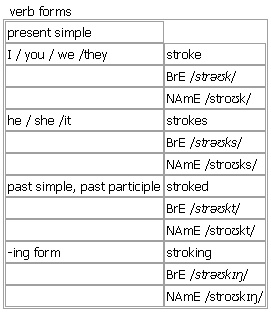|
Từ điển Oxford Advanced Learner 8th
 stroke
stroke

stroke [stroke strokes stroked stroking] noun, verb BrE [strəʊk] NAmE [stroʊk]
noun
HITTING MOVEMENT
1. an act of hitting a ball, for example with a ↑bat or ↑racket
• What a beautiful stroke!
• He won by two strokes (= in ↑golf, by taking two fewer strokes than his opponent).
2. a single movement of the arm when hitting sb/sth
•His punishment was six strokes of the cane.
IN SWIMMING/ROWING
3. any of a series of repeated movements in swimming or ↑rowing
•She took a few more strokes to reach the bank.
•He swam with long powerful strokes.
4. (often in compounds)a style of swimming
•Butterfly is the only stroke I can't do.
see also ↑backstroke, ↑breaststroke
5. the person who sets the speed at which everyone in a boat ↑rows
GENTLE TOUCH
6. usually singular (especially BrE)an act of moving your hand gently over a surface, usually several times
• He gave the cat a stroke.
OF PEN/BRUSH
7. a mark made by moving a pen, brush, etc. once across a surface
•to paint with fine brush strokes
•At the stroke of a pen (= by signing sth) they removed thousands of people from the welfare system.
ACTION
8. ~ (of sth) a single successful action or event
• Your idea was a stroke of genius.
• It was a stroke of luck that I found you here.
•It was a bold stroke to reveal the identity of the murderer on the first page.
•She never does a stroke (of work) (= never does any work).
see also ↑masterstroke
OF CLOCK
9. each of the sounds made by a clock or bell giving the hours
•At the first stroke it will be 9 o'clock exactly.
•on the stroke of three (= at 3 o'clock exactly)
ILLNESS
10. a sudden serious illness when a blood ↑vessel (= tube) in the brain bursts or is blocked, which can cause death or the loss of the ability to move or to speak clearly
•to have/suffer a stroke
•The stroke left him partly paralysed.
Word Origin:
Old English strācian ‘caress lightly’, of Germanic origin; related to Dutch streek ‘a stroke’, German streichen ‘to stroke’, also to ↑strike. The earliest noun sense ‘blow’ is first recorded in Middle English.
Example Bank:
•He played some powerful backhand strokes throughout the game.
•He swam back with long slow strokes.
•I had a sudden stroke of inspiration.
•I will outline in broad strokes our main ideas.
•She caught his likeness with a few bold brush strokes.
•She had a massive stroke and lost her speech.
•The Romanian rowers pulled ahead with fast, powerful strokes.
•The stroke left him in a wheelchair.
•The stroke left him paralysed down his right side.
•They lost half their fortune at a stroke.
•This regimen substantially reduces the risks of recurrent stroke.
•With a stroke of the pen our names were removed from the register.
•Woods leads by two strokes.
•You can't swim more than four strokes before you reach the other side.
•a stroke of genius
Idioms: ↑at a stroke ▪ ↑at one stroke ▪ ↑put somebody off their stroke
verb
TOUCH GENTLY
1. ~ sth (especially BrE)to move your hand gently and slowly over an animal's fur or hair
• He's a beautiful dog. Can I stroke him?
see also ↑pet
2. ~ sth/sb to move your hand gently over a surface, sb's hair, etc
• He stroked her hair affectionately.
MOVE STH GENTLY
3. ~ sth + adv./prep. to move sth somewhere with a gentle movement
• She stroked away his tears.
•He stroked the ball between the posts.
BE NICE TO SB
4. ~ sb (informal, especially NAmE)to be very nice to sb, especially to get them to do what you want
Verb forms: 
Word Origin:
Old English strācian ‘caress lightly’, of Germanic origin; related to Dutch streek ‘a stroke’, German streichen ‘to stroke’, also to ↑strike. The earliest noun sense ‘blow’ is first recorded in Middle English.
Thesaurus:
stroke verb T
•He stroked her hair tenderly.
caress • • fondle • |especially AmE pet • |disapproving grope •
stroke/pet a dog/cat/horse
stroke/caress/fondle sb's hair/ears/face/neck
stroke/caress sb/sth gently/lightly/tenderly/absently
Example Bank:
•He stroked back his hair.
•He stroked his beard thoughtfully.
•She gently stroked away his tears.
•She stroked his hair absently.
•She stroked the cat absently.
•He stroked her hair tenderly.
•He's a beautiful dog. Can I stroke him?
|
|
|
▼ Từ liên quan / Related words
Related search result for "stroke"
|
|
